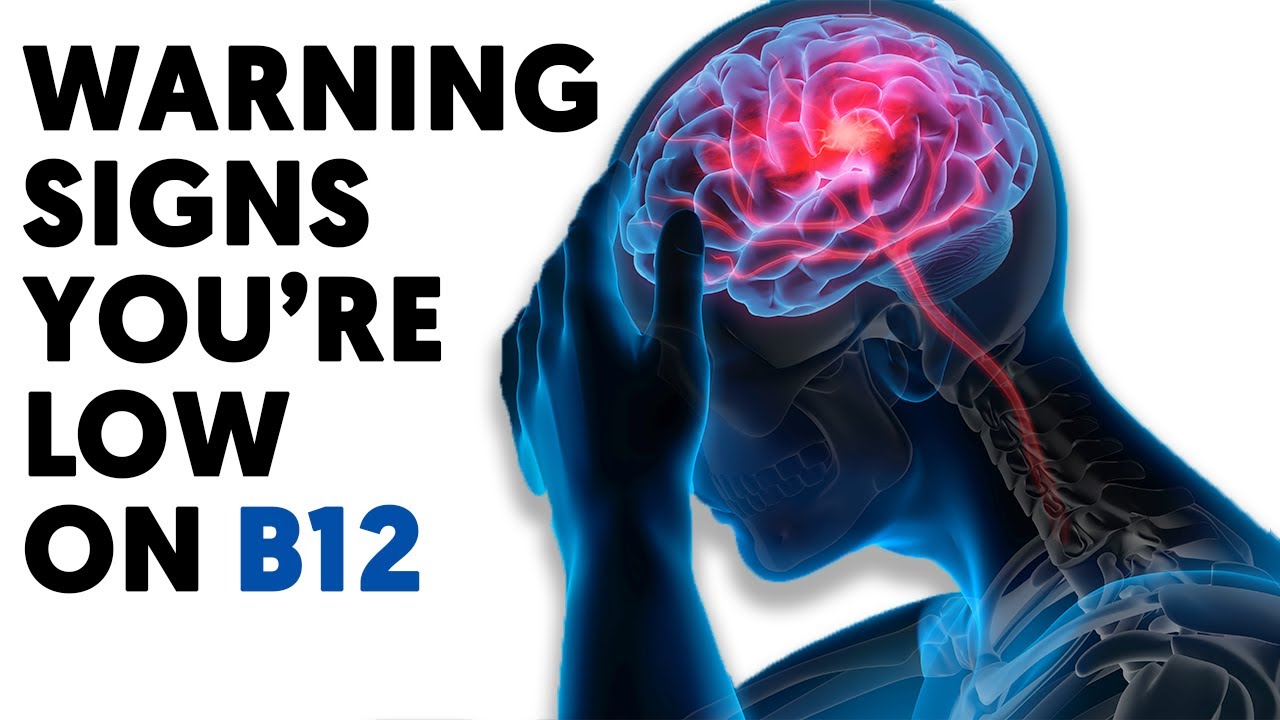Vitamin B12 Deficiency Symptoms (not to be ignored)
Vitamin B12, otherwise known as cobalamin, is an essential water-soluble vitamin.
It is mainly responsible for assisting the body in producing blood cells and DNA.
In addition, Vitamin B12 also plays a role in ensuring the proper functioning of the nervous system.
Suffice it to say, each and every single mineral and vitamin has its own role to play.
As such, it’s crucial to make sure that your body is well-balanced with vitamins and minerals.
When it comes to vitamin B12, our body cans tore it for 3-5 years, so early symptoms of a deficiency tend to appear gradually, which is why many people don’t notice them.
If you suspect yourself or someone else of having vitamin B12 deficiency, this video will either confirm or deny your suspicions.
Keep watching to educate yourself about this.
1. Feeling weak and fatigued
Often, when we feel tired, we just shrug it off as an ordinary effect of an exhausting day at school, work, or at home.
The thing is tiredness and fatigue are the most common symptoms of vitamin B12 deficiency.
When you feel unusually tired, the reason should be due to insufficient red blood cells due to the lack of vitamin B12.
Red blood cells are responsible for transmitting oxygen to the various parts of the body.
Thus, when your body isn’t receiving enough oxygen, it causes you to feel fatigued or light-headed.
2. Dizziness and breathlessness
Because you lack red blood cells, it could create other effects on your body.
Overtime when left untreated, a vitamin B12 deficiency can result in anemia.
As a result, the lack of ample oxygen on your body will make you feel breathless and dizzy more often.
3. Weak muscles or pins and needles
A drop in vitamin B12 can cause nerve issues in your body.
Specifically, it is when you experience a tingling feeling or like you have pins and needle in your body.
If that happens, then it’s an indicator of nerve damage.
Vitamin B12 is a crucial component in the process of producing myelin.
This fatty substance protects your nerves while insulating them.
Thus, without enough vitamin B12, your nervous system acts negatively.
4. Mood swings
Often, people who have mood swings are those that are suffering from vitamin B12 deficiency.
Insufficient vitamin B12 in the body leads to an increase of homocysteine, which will damage your brain tissue.
As a result, it affects brain signals and your brain as a whole, making you experience mood swings more often.
Also, there have been medical studies that have found out the links between vitamin B12 deficiency and more severe cases such as dementia and depression.
5. Mobility changes
Blurred vision is a gradual symptom of a deficiency in vitamin B12, yet also a rare sign.
When left unnoticed, the damage to the nervous system may also harm your optic nerve.
Consequently, it stops the brain from getting proper nervous signals from the eyes, thus, causing your vision to be jeopardized.
Luckily, it won’t result in permanent damage as you can simply counter the effect by changing your diet or having vitamin B12 supplements.
Dairy products, meat, and fish are rich in vitamin B12, so make sure to stock up on them.
Drop your suggestions below if you know other foods that are great sources of B12.
▶ Subscribe to the channel! – https://goo.gl/nJ8d6r
Royalty free Pictures from
www.pixabay.com
www.pexels.com
Royalty Free Music from
Audio Library – No Copyright Music



![[ID: Hx_A0iLhdr8] Youtube Automatic](https://bizimtube.com/wp-content/uploads/2021/03/id-hxa0ilhdr8-youtube-automatic-236x133.jpg)
![[ID: lp7w0UmpuIs] Youtube Automatic](https://bizimtube.com/wp-content/uploads/2021/03/id-lp7w0umpuis-youtube-automatic-236x133.jpg)
![[ID: s2-7T1TH-lY] Youtube Automatic](https://bizimtube.com/wp-content/uploads/2021/03/id-s2-7t1th-ly-youtube-automatic-236x133.jpg)
![[ID: b_lakC9M4UQ] Youtube Automatic](https://bizimtube.com/wp-content/uploads/2021/03/id-blakc9m4uq-youtube-automatic-236x133.jpg)
![[ID: r44yl6nPONs] Youtube Automatic](https://bizimtube.com/wp-content/uploads/2021/03/id-r44yl6npons-youtube-automatic-236x133.jpg)
![[ID: pAwto1YQjA8] Youtube Automatic](https://bizimtube.com/wp-content/uploads/2021/03/id-pawto1yqja8-youtube-automatic-236x133.jpg)
![[ID: XETG8azHiv4] Youtube Automatic](https://bizimtube.com/wp-content/uploads/2021/03/id-xetg8azhiv4-youtube-automatic-236x133.jpg)
![[ID: f3G_-S_2HUk] Youtube Automatic](https://bizimtube.com/wp-content/uploads/2021/03/id-f3g-s2huk-youtube-automatic-236x133.jpg)
![[ID: G8oWns54snA] Youtube Automatic](https://bizimtube.com/wp-content/uploads/2021/03/id-g8owns54sna-youtube-automatic-236x133.jpg)
![[ID: s0lIFXhu6aw] Youtube Automatic](https://bizimtube.com/wp-content/uploads/2021/03/id-s0lifxhu6aw-youtube-automatic-236x133.jpg)
![[ID: 4UTd2Ev8eYg] Youtube Automatic](https://bizimtube.com/wp-content/uploads/2021/03/id-4utd2ev8eyg-youtube-automatic-236x133.jpg)
![[ID: RKBGBjVJBxQ] Youtube Automatic](https://bizimtube.com/wp-content/uploads/2021/03/id-rkbgbjvjbxq-youtube-automatic-236x133.jpg)